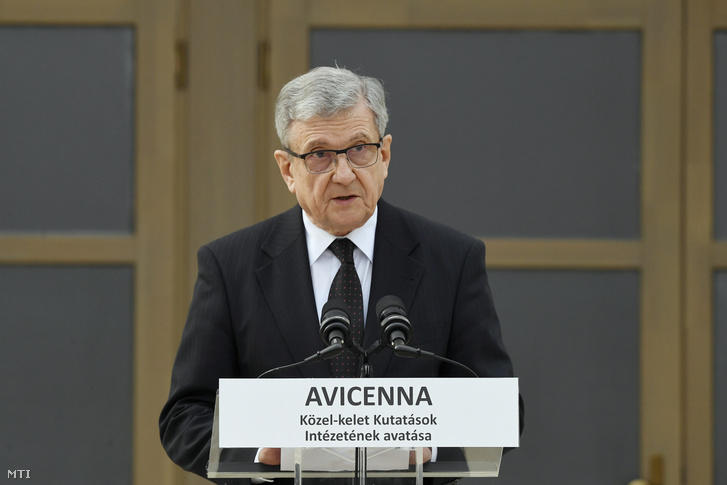Hungarian Academy of Sciences turns to Constitutional Court against law taking away research institutes

On Monday, the President of the Hungarian Academy of Sciences, László Lovász has turned to the Constitutional Court to seek the annulment of the law passed in July taking away the research network from the Academy and giving control over those institutes to a newly established governing body, over which the Government has considerable influence. In the meantime, Miklós Maróth, the new president of the research network started his reign with a letter attacking researchers.
As of 1 September 2019, the research networks formerly belonging to the Academy are under the control of the Eötvös Loránd Research Network (ELKH), a governing body comprising six members nominated by the Ministry of Innovation and Technology, six by the Academy, and a jointly nominated president, all appointed by the Prime Minister. The president of the ELKH is Miklós Maróth, an Arabist and classical philologist who is a close ally of Prime Minister Viktor Orbán.
As decided by the 12 June resolution of the Academy's Governing Board, the President of the Academy filed a constitutional complaint against the law on Monday, a day after it entered into effect and the legal possibility to do so opened.
The complaint was published on the Academy's website on Tuesday afternoon, and in it, Lovász seeks annulment of the law that, in the Academy's view, violates academic freedom and the Academy's right to hold property. Here are the details:
The Academy's right to hold property
The law in question obliges the Academy to provide usage rights over all of their assets that were previously used by the Academy's research institutes for the new Eötvös Loránd Research Network.
The law prescribes no remuneration for these usage rights, and no temporal limitations either.
The Academy's constitutional complaint states that even though the law clearly says that the assets (buildings, research equipment, and whatever else the institutions used for their daily operation) remain within the Academy's property, all component rights of this ownership are annulled by the law. The Academy is still the owner of these assets on paper, but practically speaking, they can do nothing with their property. As the complaint reads:
"The cited provisions on the obligatory transfer of usage rights entirely limit the Academy's right of disposal, (...) the right to make the decision whether or not the owner would want to transfer usage rights over their own property."
The Academy's position is that hollowing out their property rights in such a manner is legally equivalent to expropriation, which is only constitutional under certain conditions: It has to be set forth by law, done exceptionally, in the service of public interest, and with immediate and unconditional compensation.
While admitting that the measure was indeed set forth by law, the Academy argues that the other conditions remain unfulfilled:
- The Academy did not receive any remuneration whatsoever for the rights they were forced to give up;
- It was not exceptional, as in this context, exceptionality implies necessity and proportionality. That means that the measure can only limit rights to the narrowest extent necessary for the public interest to prevail. The public interest in question is more efficient research, and as the Academy notes, this intended increase in efficiency could have been achieved through other means. More than that, efficiency does not at all depend on who owns the buildings and research equipment but on financing, working conditions, incentives, etc., which could all have been provided within the Academy's structure.
The Academy's complaint also notes that giving these rights up cannot be interpreted as a "public task," as that term refers to continuous activity while handing the assets over is a singular act.

Violation of institutional and academic freedom
As the Academy's complaint reminds, the Hungarian Fundamental Law vows to protect the Hungarian Academy of Science and specifically its academic freedom. The constitutional protection provided by this clause added in 2013 is two-sided:
- It protects the Academy's existence and legal standing (institutional guarantee),
- and it protects the Academy's freedom to practice science (academic freedom).
The law passed in July changed brought major changes to the substantial attributes of the Academy, and according to the complaint, it is in direct violation of the abovementioned institutional guarantee which was meant to protect the established legal standing of the Academy as it was in 2013, when the constitutional provision was implemented.
The complaint also notes that by definition, the new law makes it impossible for the Academy to practice their academic freedom.
The Academy dispels the notion that academic freedom is the right to freely express scientific opinions, as that right is guaranteed by the freedom of expression. Instead, the complaint reminds that:
"Academic freedom is the freedom of scientific activity (research), and it entails the free choice of the subject, the methodology, and the evaluation process of research activities. Partly, this warrants an individual freedom, but even more so, it means the collective practicing of these individual rights, which is what we could call the autonomy of science."
Besides taking away the research network as a whole, the new law even removes the section defining Academy's public task of maintaining a scientific research network from the Act on the Academy. This renders the Academy institutionally and legally incapable of doing scientific work, and as such, prevents the Academy from practising their constitutionally protected academic freedom as well. In layman's terms: You can't put a nail in the wall without a hammer, even if they tell you that you have the right to do so.
Miklós Maróth attacks researchers on his first day
In the meantime, Hungarian political daily Népszava reported that the new leader of ELKH, the umbrella-organisation in charge of the Academy's former research network, already addressed a stern letter the Democratic Union of Scientific Workers.
Amongst others, Maróth told the union to think about
what should be done about those researchers who hold multiple jobs and whose "income exceeds that of ministers."
Maróth requested the union to make suggestions about the main principles by which a performance-oriented salary system and a system of professional employee evaluation should be established. Maróth complained that researchers of the Czech Republic produce 360,000 scientific papers a year, while Hungary lags behind with a mere 210,000.

A researcher speaking to Népszava called that a "gross oversimplification," noting that Maróth is looking at the wrong data - the number of works is indeed higher in the Czech Republic, but Hungarian papers are cited more, even though Hungary spends only 1.3% of its GDP on research compared to the Czech Republic's 2%.
In his letter, Maróth admits that he is still yet to visit the research institutes to get informed about their situation. As Maróth wrote: "If getting to know the system and establishing the channels of communications are behind me, then we can start working regularly."
Lovász says his farewells
Which was not a goodbye, as the President of the Academy insisted in his letter sent to researchers on the same day as Maróth, the day when the law entered into effect.
The President of the Academy urged researchers to keep doing their work with the same devotion as they did before, only adhering to their own professional standards and to the professional expectations of their peers. He encouraged researchers to keep thinking of the Academy as their own, even after parting ways structurally.

As Lovász put it, the tasks of the academy may have changed, but its goals to represent Hungarian science in international forums, and to ensure the academic freedom and outstanding scientific performance of Hungarian researchers have not. The President noted:
"Representatives of Hungarian science were united by the year that is behind us. It is my conviction that this unity, created by external pressure, cannot be brought down even by the new institutional framework implemented by changing legislation. I am also convinced that the members of the ELKH nominated by me will not only strengthen this sense of unity, but they will guarantee academic freedom. The members nominated by the Minister cannot have different goals either.
We all know what happened to Hungarian scientific life during the past year. However, many - including myself - still do not comprehend why exactly it happened. I can still only hope that the changes pertaining to the research network of the Hungarian Academy of Sciences will eventually make sense, and they will become a part of an overarching reform a result of which would be a more efficient and better funded system."
(Cover image: Demonstration at the headquarters of the Hungarian Academy of Sciences for protecting the Academy's research network in Budapest on 2 June 2019 . Photo: Pavel Bogolepov / Index)

Support the independent media!
The English section of Index is financed from donations.


